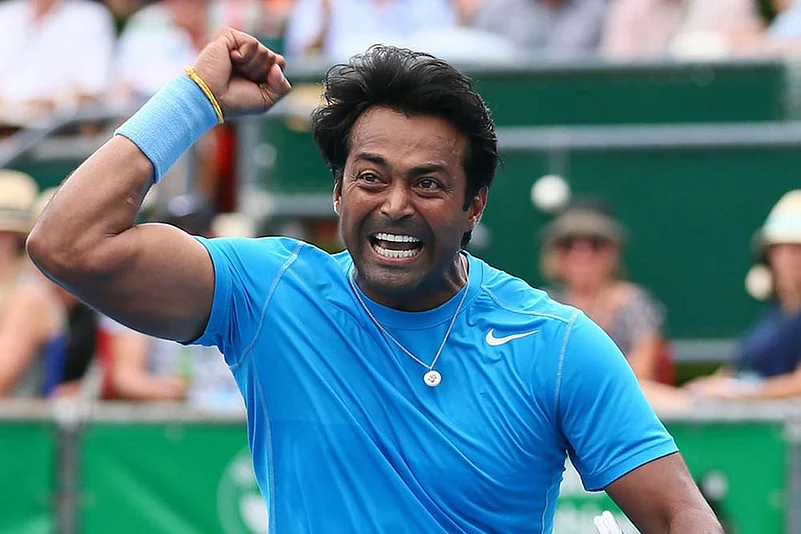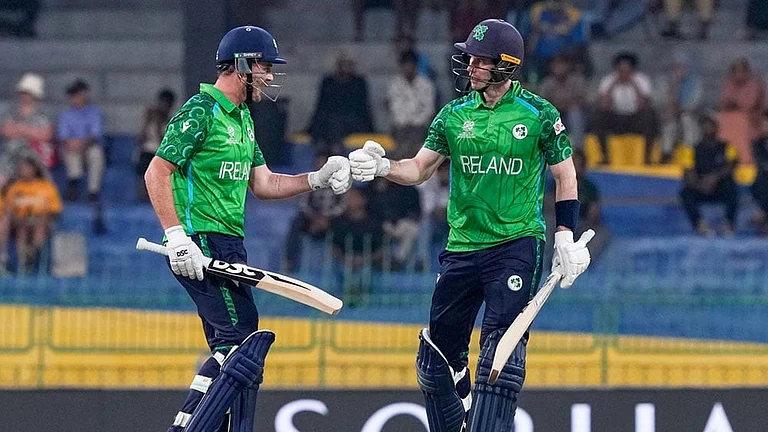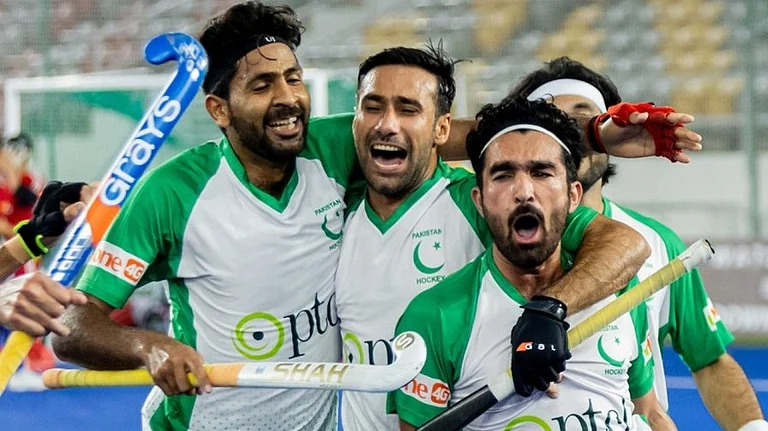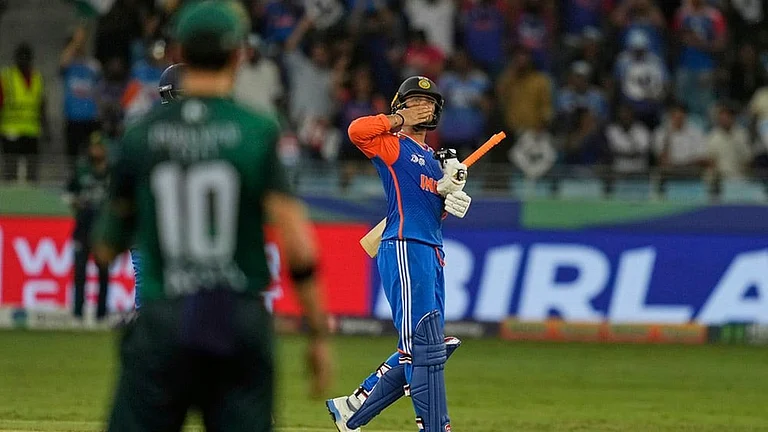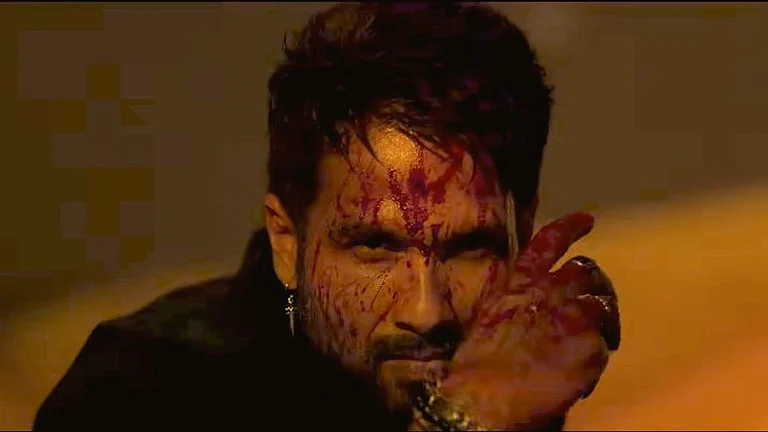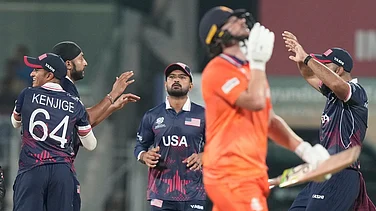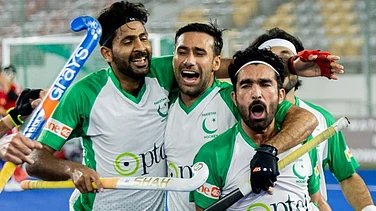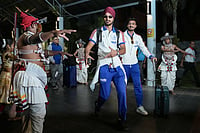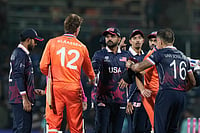To measure the contribution of the inimitable, and irreplaceable, Leander Paes to Indian tennis, one just has to look at the success percentage of his 30-year Davis Cup career: an astounding 72.65 per cent (singles/doubles, on all surfaces). Also, the 1996 Olympic bronze medallist holds the Davis Cup world record of most wins: 45 (77.58 per cent) in 58 ties played. Still, the ageless Paes, who turned 47 on June 17, is not averse to continuing, post-Covid shutdown. While cleaning his Mumbai apartment during the lockdown, he spoke to Qaiser Mohammad Ali in a free-wheeling interview. Excerpts:
You have been doing a lot of things during the lockdown, cleaning your house etc. So, how was the Covid-19 lockdown period for you?
The lockdown period has been quite difficult for everyone. For me, in particular, my job has come to a standstill. Having a job like playing tennis, professional tennis requires a lot of travel, playing in different cities every week, in different countries every week. And this moment in time, the whole job has come to a standstill. What is even more worrying is that I don’t foresee our profession of tennis re-starting for the rest of 2020. I think I will be out of the job for this whole year. That being said, when you look at most people around now, everyone is affected by Covid; it’s a global pandemic. I think the repercussions of Covid, when you look at the economy around the world, has taken a drastic hit; it has dropped drastically. It’s a very worrying time we are going through.
This was supposed to be your last season in professional tennis, called #OneLastRoar, isn’t it?
Yes, I had already announced #OneLastRoar season. In Australia, I got a wonderful farewell. In Pune, Bangalore, Dubai also I got a wonderful farewell. My last Davis Cup was in Croatia this March.
Since you have not been able to play all the tournaments you intended to play this season, would you be reconsidering your decision to retire?
Right now, I believe, the call of the day is to stay safe, to practice social distancing, good hygiene, to look after our loved ones, and our staff to share the responsibilities. As far as my last season goes, the first thing is to win this battle against Covid-19. Once life comes back to normal, my team will then evaluate whether I should continue or not. Right now, we have a bigger battle to fight.
Who all are in your ‘team’? Your father, Doctor Vece Paes, of course, is part of it. Who are the others?
I’ve got a tennis coach, a fitness coach, a mental trainer, doctors, physiotherapist, confidants…it’s a huge team. All of us are very well connected, and we sit and discuss new and innovative ways of how to keep improving and new goals for ourselves. If we have any issues like injuries and the one we are having right now, we make a collective decision. I respect their opinion very much. I have to sit and listen to my own desires. Over the last 30 years, the team has grown big.
One consolation of the lockdown has been that one of the very important members of your core team, your father, is staying with you [in Mumbai]. So, won’t it be easy to discuss your career with him on whether you extend it or not?
My father is not just my father; he is my hero, my guru, my confidant, my best friend, and my personal doctor. He is one of the first people I constantly have communication with about my decisions in life and tennis. Also, it is very important at this moment in time to spend time with him because he is a senior citizen; he is 75. And has his own medical issues. To be able to look after him is the greatest honour that I can have, more than my career and my life. I'm blessed that I’ve a chance to look after my father and take care of his medical issues.
I am sure your future career will not be decided in one sitting…
Hundred per cent.
So, when you sit across the dining table even these days, do you two discuss these things?
Well, my father and I have discussions in many different ways. We discuss life, philosophy, family, sports education training, health, emotional fitness, mental fitness, goals of my tennis profession, and goals as a family. We have a very open relationship. A big reason of who I am today is because of my parents. We know the people who have caused the hardships to us and people who have been with us in those hardships. Our philosophy is to make the best of the situation we are in.
How is your body responding to play as you turn 47 [on June 17]?
Very good. My body is in great shape. I’ve been blessed with fabulous genetics. But at the same time I have worked tremendously hard since I was six-seven-eight years old. It’s not easy. I don’t think people realise how much hard work goes into winning one Grand Slam, let alone winning 18; playing in one Olympics. But playing seven Olympics is a different ballgame.
Had the 2020 Tokyo Olympics been held this year you might have qualified to play in your eighth straight Olympic Games. But since they have been postponed due to Covid-19, would you still consider it while deciding your decision to retire?
I think physically I am very fit, strong; but emotionally and mentally is the real task. So, basically those two things are really the important part – to stay emotionally and mentally fit and happy – because you never forget to play tennis. I’ve played for so many years, so the muscle memory is there so deep. The muscle memory of tennis will always be there. The fitness levels and training systems it takes to play in the Olympics will always be there. But emotional and mental fitness and happiness is important. That’s the focus.
You skipped the important part – the 2021 Olympics factor.
Oh, you can't tell now, because no one knows when the lockdown will finish and no one knows when the tennis will start again. There’s even a talk of the Olympics going to 2022 because the economy has dropped so badly in Japan, or anywhere in the world. So, it’s impossible to answer the question because even I don’t know when the ATP Tour will restart.
On the Davis Cup website, India is scheduled to play Finland in a first-round World Group I tie from September 18-20 in Finland. Are you looking at that also if that tie takes place?
Yes. Definitely, I am looking at that. Against Croatia, doubles was the only match we won recently. Doubles is very important in Davis Cup; sometimes a tie rests only on the doubles. So, if the tie happens in September and if I am in chosen, I will put myself forward. I’ve always put myself forward for the country, no matter what.
Year 1989 was an important one for you and Sachin Tendulkar. You played your first Grand Slam competition [Australian Open] and Sachin made his Test debut. Sachin retired from all cricket seven years ago and you are chugging along. What is it that has kept you going till now?
I’ve tremendous respect for what Sachin has done. He is a very dear friend of mine. He has done an amazing feat in his long career. And a lovely man; I know him personally. So, it’s very nice to share that relationship with him. For me, my main focus has been physical fitness. And because of the sports that I play, physical fitness is so important and the physical attributes of a tennis player is so demanding that I had to focus on that. One is having the genetics that my parents have given me; I had to work so very hard to keep my fitness level very high.
Did you realise very early that if you had to last long on the international circuit you had to be fit all along?
Hundred per cent. Not just in terms of longevity, but also in terms of performance. Tennis is not just about technical serving etc. No. Tennis is about emotional fitness, mental fitness, physical fitness because a tennis match can go on anywhere between one and a half hours to five and a half hours. There’s no set time. In that I think tennis is the most demanding sport physically and mentally. I also feel that mental fitness is so important for my career because 99 per cent of my tournaments are played outside India and hence the travel involved. The cost of a tennis career is immense; it’s incredible. I left home when I was 12 years old [when admitted to the Britannia Amritraj Tennis academy in Chennai]. From 12 to 47 years I have been travelling, working for 40-plus weeks a year at tennis for 30 years. There is no guarantee in tennis. There’s no club or league that pays me a guaranteed salary. All the tennis players in the world have to invest in themselves, with no guarantee that they will be earning that money back. We all have to win matches and tournaments to win that money back. If you look at most tennis players in the world, they are lucky to break even in their earnings to expense ratio.
How did you convince foreign players to partner you, even as you were growing old? You have partnered almost all the top players, be it the mixed doubles or the men’s doubles.
I think the answer is right there you mentioned it – because I keep winning, other people want to win with me. The formula of winning is a very potent ingredient and the real champions have that. Winning one or two Grand Slams is one thing, but to repeatedly win Grand Slams – 18 – takes a lot of effort. There’s a certain formula that you have to follow in your lifestyle, a lost discipline, a lot of hard work, a lot of simplicity. Not many people can live this formula because it can be a very boring formula, hence they don’t get the results. Also, most people focus on me because I have won 18 doubles and mixed doubles Grand Slam. But I have also won the Olympic singles bronze, in 1996, besides winning the Newport Hall of Fame singles title in 1998, and beating Pete Sampras in 1999, Roger Federer in 2001, and winning Davis Cup singles matches. I think those singles results anybody would be ‘wow’ to have. Today, the visual of me is longevity, but my beating the top-ranked guys is only overshadowed because I have won so many Grand Slams.
While it is correct that the focus is on your doubles play especially as you have won so many Grand Slams, but it is also a fact that you have won only one ATP singles title in Newport in 1998.
If you look at the ATP there’s one singles title. If you look at the Challengers, there are more than 50 titles. In Davis Cup singles, there are umpteenth wins [48 wins, 22 loses]. But in 1998, I got to my highest singles ranking, 73rd, and I got into the main singles draw in all Grand Slams as well as ATP. I had to make a decision whether to focus on singles, which is what I wanted to do, or whether to prove to India that there could be Grand Slam champions. At that point, tennis was changing, playing surfaces were becoming slower, balls were becoming bigger, and much slower. Hence, for me, being a serve-and-volley player, a fast court player, the physical and mental effort, and the hard work that I had to do for singles, would mean that I would have had to focus only on the singles. Or, prove to India that we can be world champions and win Grand Slams. That was an evaluation that I had to do in 1999. The previous year, I won the Newport in July, beat Pete Sampras in August, and won umpteen number of Challengers. Apart from being world No.73 in January 1999, I also got into all four Grand Slam doubles finals, and we [along with Mahesh Bhupathi] were world No.1. In 1999, when I was in top 75 in singles, I had to make a decision. And had I known then that my career would last up to 2020, I would have definitely focussed on singles for five more years.
And you made that decision in consultation with whom?
Obviously, with my coaches, trainers, Mahesh -- my team. There were mixed views. My view was to focus on singles more. My team had different views; obviously, other people said focus on doubles, so that you can win Grand Slams. They said: ‘If you play singles, then you would be so tired, so how would you win Grand Slam doubles.’ Each Grand Slam is 14 days long. If you get to the singles’ third round of the US Open, like I did in 1997, I felt that focussing on singles would take away from doubles. As we can see, till 1998, I hadn’t won even one Grand Slam. That knowledge of winning a Grand Slam, so many Grand Slams, wasn’t there. So, if that year I had the knowledge that I would last till 2020, I would have continued for five years more in singles. So, from being world No. 73 in 1998, I would have tried to get into top 50. That would not have been a huge jump because I was in the main draw of all the events. Winning one or two matches minimum in all the Grand Slams I would have been in top 50. But then I wanted to see from being 73rd could I get into the top 25? Could I get into the top 10? That was the real task. I was junior US Open and junior Wimbledon champion. If I could win the junior singles, I wanted to push to see if I could win the senior singles.
Did you also factor in Davis Cup play while deciding to focus on the doubles?
Hundred per cent. The Davis Cup results were a huge factor in my mind because we were having great results. That was on my mind at the decision making time in 1998. You had to make the best decision with the best knowledge I had then.
Let’s come back to my original question: what was the mystery that top players partnered you in doubles and mixed doubles play? Factors like your commitment, honesty, and hard work were very obvious to fans, selectors etc. Players too must obviously have seen that. What was the thing that you told them that they would get if they agreed to partner you?
I think the most important commitment to a partnership is honesty of hard work, honesty of communication, and unconditional understanding. These two are the most important things that you can promise to anybody in the world. If everybody goes out to build a successful partnership, those are three pre-requisite criteria. I think most people know that when they partner with Leander what level of hard work, commitment, and quality they would get.
On January 22, 2019, you posted a 20-second video of a long rally of your mixed doubles match partnering Australian Samantha Stosur at the Australian Open. It has been watched over 62,000 times. Is it one of the ways you motivate yourself or was it just for fun?
Hundred per cent it is one of the ways I motivate myself. If you look at the career I’ve had, achieving a certain benchmark you have kept motivating yourself, pushing yourself to create greater heights. So, social media platforms like YouTube also give us great learning. I’ve got a lot of videos of my matches. I watch a lot of videos and do a lot of visualisation. Part of my mental and strategic training is a lot of video watching.
What changes have you made in your food habits? And have you given up any food items completely to stay fit?
I was vegetarian for about 12 years – from the age of about 12 years when I joined BAT, till about 25 or so. After that my diet evolved overtime. First, I had a coach who was a strict vegetarian and a vegan, in 1986 or 1987. But then I was struggling with protein and was getting cramps. In the mid-1990s, I was still young and my body was still developing. And I was getting a lot of cramps in Davis Cup. One is that I would lose a litre of water in every one hour of training that I would do. In that knowledge of testing my body, my diet, and my fitness, I realised that my protein levels were down and I was struggling with cramps a lot. So, in late 1990s, I switched to adding some Omega-3 [fatty acids supplement], which is river fish, sea food, and Salmon, into my food.
Was it your decision to not eat non-veg dishes at BAT, or was it not served there?
It was definitely served there. It was a conscious decision. Some of the kids who were in the academy were vegetarian. But we all had our own choice. I was very, very close to the coach. We would listen to him. If he would make us run seven kilometres on Marina Beach in Madras four days a week, we would do that. He would ask us to do 50 sit-ups and 10,000 skips and I would do that. Even after the training, after everyone would go to sleep, I would do some more fitness by lighting a candle in front of the mirror, because I was not the most talented player in the academy. I was actually the worst player when I joined; the least experienced in tennis. But I knew that through hard work I was going to succeed.
In 2003 you fell seriously ill. Non-vegetarian food and associated things were a reason for your illness. What were your thoughts lying on the Orlando hospital bed?
First thing, the diagnosis that they gave me was completely wrong. They said I had a tumour in my brain and that it was a cancerous tumour. So, the scare factor in the beginning was really crazy. The thought process was that they needed to. The first two months were very, very tough because they didn’t really know what the diagnosis was; people were testing out what to do. They did biopsies that left scars on my body. They did MRIs, scans and blood work. All along I didn’t feel I had cancer as for an athlete we are in tune with our body. I was not a doctor – I am a spiritual man – but I felt I would get through this and definitely survive. After I won the Wimbledon mixed doubles title with Martina Navratilova in 2003 – that was my last match before I went to hospital, I believe. That was a tough time. But I wasn’t sure I would play tennis again. I wasn’t thinking about tennis; I was thinking about survival.
You also did a film, Rajdhani Express, in 2013. What were the reasons for doing it? Did you want to take mind off tennis or something else?
It was a bucket list. It was something I wanted to do as a young boy. I actually wanted to get into theatre, which is something I love. Opportunities were coming frequently to me about getting into movies. But my tennis schedule was so busy it didn’t allow me to do training for films. I remember I had a little time on my hands that year. The original script and the star cast were brilliant: it had Paresh Rawal, Anupam Kher, Tabu, Diya Mirza, Gulshan Grover, and Mukesh Rishi etc. I felt their ability and expertise will hold the movie together and give me a chance to be explored. But along the way, the story and the star cast changed. But I enjoyed my acting experience because it gave me a realisation of how a cinema world gives jobs to so many people. On an average, we had about 400 on the sets everyday; that’s 400 families.
You got a film offer just after you won the Olympic bronze in 1996. But you were not keen on films then?
I have been getting film offers since I was young. I was so focussed on tennis that there was no time to explore other dreams and that is why I gave up on a lot of opportunities that were there.
Overall, you have had a chequered career, if you don’t mind, not just in terms of on-court play but off the field as well, and at times you were treated unfairly when it came to selection etc.
I think I have had a very blessed career; a great, long career. A long career with many ups and downs -- every person will tell you that. I’ve been unbelievably blessed to have around 72 per cent win-loss record in Davis Cup [72.65% singles and doubles combined on all surfaces, till India’s tie against Croatia in March 2020]. For any athlete to have a better than 50 per cent record is normally unheard of. In every person’s life there are ups and downs. What life throws at you is not necessarily in your control. But how you react to it and what you make of it is in your control. And I always put my country before myself.
But at times you have spoken your mind. Do you think you have suffered because of that?
I think, like I said, people can talk a lot. But I always spoke with my racquet and that was important.
You mentioned you were very close to a coach at the BAT. There were several coaches at the BAT – Ted Murray, Dave O'Meara, and T. Chandrasekharan. Who were you referring to?
All of them. I was close to all of them. Dave O'Meara was with me when I won junior Wimbledon in 1990. There were so many coaches at BAT, all from Peter Burwash International.
What were your goals back in 2013 when you said you were at a “crossroads”?
I can’t remember which interview you are talking of in which I said I was at a “crossroads”. It’s tough to recollect backwards, but I am not sure if I had won a career Grand Slam in doubles yet; I did it in 2012, if I am not mistaken, with Radek Štěpánek at the Australian Open. For me, it has always been writing history books. I always wanted to put India on the global map.
Out of the many doubles partners that you have had who did enjoy playing the most and why?
All of them. Every one of them taught me something new, whether it was with Radek Štěpánek – he was a singles player trying to play doubles – whether it was a Mahesh Bhupathi. Together we proved to the world that we could be world champions and be a Grand Slam winner. Martin Damm, whom I had known since he was 14, had retired six before I asked him at the 2003 US Open to play with me. I told him my evaluation is that you could still win a Grand Slam. He laughed at me, and said for 20 years I couldn’t, so what makes you so sure about it. He said he needed permission from his wife.
What used to be your schedule on a match day in a competition, like waking up time and eating etc?
Match day was a very specific schedule. And since I was you my coaches made it a ritual what to do on match days; it wasn’t something you felt you did. No. And that is the magic. You can win one Grand Slam with luck also, if you have a good two weeks of play and are in a zone. But to repeatedly win it takes a lot of perseverance, hard work that takes a lot of routine, which gets very, very boring and tough. Not just the fitness side, but the discipline side of it takes a lot. Most people get tired of the routine.
What goals did you set for yourself when you won the junior Wimbledon at 17 and became world No.1 junior player in 1990?
At that stage, I was still trying to believe if I could be a Grand Slam champion. Until then I hadn’t proven it. In January-February 1990, I got to the junior Australian Open final, after qualifying. I lost the final, but it gave me a lot of belief that I can possibly win a couple of Grand Slams. Losing that final gave me the hunger to work even harder. While I was getting into the final in Australia, Naresh Kumar picked me for the Davis Cup. I was surprised.
You also wanted to win an Oscar, isn’t it?
Someone had asked me about my dreams. I said my dream was to win Wimbledon, an Olympics medal, win an Oscar. I have pretty much super succeeded in all my tennis dreams.
Were you serious when you said that Oscar thing?
Of course, yes. It was a dream. But you realise some, and some you don’t. The beginning of any achievement is a dream.
You are delivering motivational speeches these days. How did this idea come to you and when and where was your first lecture?
Throughout my life, whether I was with my sisters or my friends, I was always the leader, or captain, of the pack. With some teams I have not been a leader and I have to follow and blend with the role. Through my 30-year career, I found that achieving greatness is all about getting humans to be the best versions of themselves. Everybody is an expert in his/her field. I think it’s important to motivate people, to show them some examples, not to tell them “do as I say”. Also, from age 12, I have been an individual entrepreneur as I had to handle my passport, travel details, hotel bookings, reservations, money. I didn’t have my mum and dad around when I left home at 12 to pursue my tennis. Most people think tennis players are very rich, but they don’t realise they are not part of a team or a league where a salary is guaranteed every month or every year. So, the risk involved is huge. The average annual expenditure of a professional tennis player is Rs.3 crore – year on year. And then, you have to win matches to earn that money back. If you do that, you are lucky. Ninety per cent of players from India barely break even. From age 12 I’ve been looking after my ‘business’ globally for a living. So, basically teaching the skill to a corporate man/woman how to handle their day-to-day life to be able to bring expertise in their business comes very natural to me. Corporate speaking is one of the things I am embarking on a lot now because I’ve the time for it.
When and where was your first lecture?
It was in September 1990, after I won the junior Wimbledon, and it was in Calcutta. But I was not paid for it. I have mastered this art since I was a young boy.
These days there’s a trend of biopics being made on legendary sportspersons. Is yours also in the pipeline?
There’s a lot of opportunity there. We will see how it goes. There are a few things I am working on. I will take one step at a time.
So, if, and when, that happens, will you play your role or let someone else play you?
Definitely, somebody else. But there are so many ways to do it -- whether it is a documentary series or using archives. I think it will all depend on the director and what his team thinks best. But in my opinion definitely somebody else.
After you retire do you plan to be on the governance side on a body like the ATP?
I never say no. But of the right offer, the right opportunity comes, only then would I do it. I am open minded to life.
And what about in Indian tennis administration?
Like I said, if I get the right offer where I can make a difference then I would do it.
What is your take on the talk of merger of ATP and WTA?
Interesting. I need to get some more details.
When is your autobiography coming?
We have been working on it for a long time. We will see how it goes down the track.
There’s a talk of equality in prize money of men’s and women’s competitions. Your take.
I am definitely one for equality. I think the true essence of equality is important, and it is not evaluated by gender or by different strengths and weaknesses; it is evaluated in a corporate world by what revenue one is bringing. I am 100 per cent all for equality.
(An abridged version of this interview appears in the current issue of Outlook)






